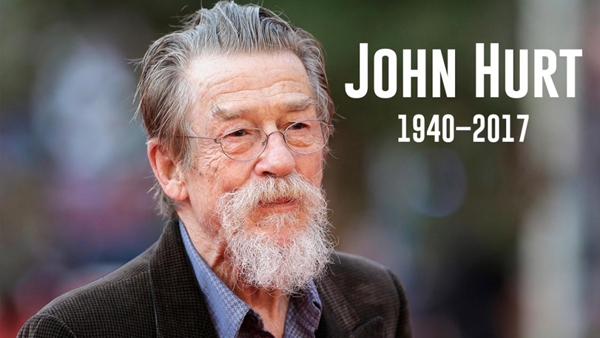Obituary of Sir John Hurt (1940-2017)
- By Heiko Khoo
 0 Comment(s)
0 Comment(s) Print
Print E-mail China.org.cn, February 3, 2017
E-mail China.org.cn, February 3, 2017
|
|
|
The world's stage has lost one of its greatest players, who could bring out the nuances of a book into a character's performance. |
The actor Sir John Hurt died on January 25, of cancer at the age of 77. Hurt was a man of extraordinary talent. He could play complex, sensitive, inquisitive and deep characters like few other actors in our time. His acting craft revealed a deep empathy, understanding and awareness of the psychology of power in interpersonal and social relations.
Hurt grew up in Chesterfield in Derbyshire and his father became a Church of England clergyman. His childhood experience was scarred by strict prohibitions on him mixing with other children and by the mental wounds left by a sexually abusive school teacher. However, he found himself naturally drawn to acting from his first performance in a school play where he played the role of a girl.
His parents encouraged him to pursue a career in art hoping that he could secure a stable job by teaching art. He studied at the famous St Martin's School of Art and was a skilled painter. However, it was the expression of his persona in the alienation of observed or imagined characters that captivated his soul, rather than the externalization of inner sensitivity through the plastic arts. Acting simply felt right and the development of characters gripped his mind and obsessed him.
His parents did not approve of his chosen vocation. When Hurt was asked if his father, who was a vicar, had opposed his career choice, he replied: "Well, he couldn't really disapprove, could he? It's just the same business but a different department. So, he didn't disapprove."
Hurt's voice and personal character almost always appeared to betray a sense of vulnerability. He played the lead role of Winston in a splendid film version of Orwell's classic 1984. Hurt's Winston is a shy and timid man who embarks on a secret and personal search for truth, unsure of why he is doing so, but convinced that his mission is noble, necessary and unavoidable.
His character contrasts brilliantly with his nemesis - the cocksure and calculating Richard Burton, who plays O'Brien, a high official in the inner-party elite. O'Brien entices Winston into his own destruction and initially treats Winston as if he is his father, mentor and ally. He wins Winston's trust and confidence, all the better to crush him later.
Winston falls in love with a rebellious, androgynous, gamine called Julia. Their love is desperate, fleeting, passionate and gentle. She incarnates a natural and free spirit - the anathema of Big Brother's all seeing power and control.
It is a standard refrain that a film can never do justice to a book but Hurt brings out nuances of Winston as a character that offer additional insights into the nature of totalitarian power to those in the original text.
Hurt also played Raskolnikov in a magnificent BBC adaption of Dostoyevsky's "Crime and Punishment" in 1979. At the time it was produced, there was always something contrived about the atmosphere and sound of BBC period dramas, which tainted many of them. However, Hurt managed to cut through this, to generate an extraordinarily subtle character. He excelled in portraying the transformation of the student into a killer; and he portrays this tortured soul being enticed into confession by the friendly and persistent police inspector.
In 1976, Hurt was the Emperor Claudius in "I, Claudius," a BBC dramatization of Robert Graves's book. This is a complex and truly classical examination of the decline of the Roman Empire. Hurt manages to adopt the deranged, paranoid and power-mad identity of an emperor's descent into insanity. This reflects the decay eating away at the foundations of power during an epochal crisis of the system. His chaotic, erratic and deranged impulses tear his inner being asunder.
Probably his most influential role was as the thoroughly effeminate homosexual and civil servant, Quentin Crisp. At that time in Britain overt homosexuality would evoke violence and aggression. Hurt's performance was truly ground breaking for he revealed the incredible torment and gratuitous violence that Quentin Crisp suffers simply for being true to himself.
Then, in the "Elephant Man," made in 1980, Hurt becomes the ultimate outsider. It is the tale of a real man whose hideous deformities condemned him to ostracism, horror, and terrible mistreatment as a circus beast. Hurt takes the viewer into the inner being of the mistreated beast to reveal the cultivated, enthusiastic, and almost childlike beauty inside.
The world's stage has lost one of its greatest players.
Heiko Khoo is a columnist with China.org.cn. For more information please visit: http://china.org.cn/opinion/heikokhoo.htm
Opinion articles reflect the views of their authors, not necessarily those of China.org.cn







Go to Forum >>0 Comment(s)